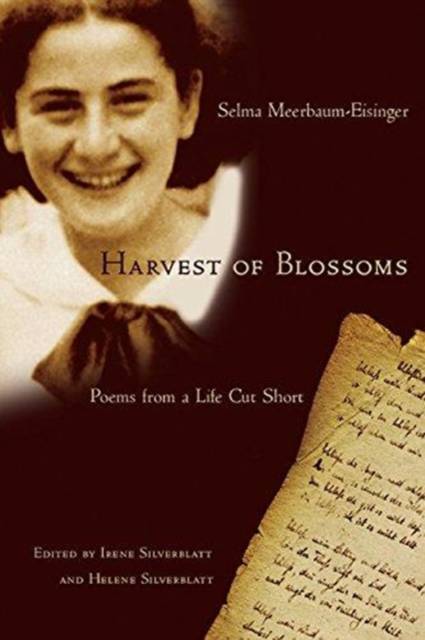
- Retrait gratuit dans votre magasin Club
- 7.000.000 titres dans notre catalogue
- Payer en toute sécurité
- Toujours un magasin près de chez vous
- Retrait gratuit dans votre magasin Club
- 7.000.0000 titres dans notre catalogue
- Payer en toute sécurité
- Toujours un magasin près de chez vous
Description
A rediscovered poetry collection from a lost voice of the Holocaust Revealing an artist of remarkable talent and enduring hope, this collection of poetry will join Anne Frank's diary as a touching reminder of what the world has lost by a life cut short. The poems written by Selma Meerbaum-Eisinger are astonishing for their beauty; it is equally astonishing that they have survived at all. Selma Meerbaum-Eisinger was born in Czernowitz, Romania, now Chernivtsi, Ukraine. Czernowitz, known for its vibrant mix of languages and ethnicities, was famously described by Selma's cousin, poet Paul Celan, as a city "where human beings and books used to live." Her childhood friends speak of Selma's liveliness and irreverence, her sparkling and mischievous personality, her charming, careless appearance, and her independence. Selma was passionate about ideas, literature, music, and art.As the storm of hatred gripping Europe broke in earnest, Selma expressed her desires and fears in poetry. Between the ages of fifteen and seventeen, Selma wrote fifty-two poems and five translations--two from French, two from Yiddish, one from Romanian--that are published here. Selma's verse addressed the longings of a young woman in love; in equal measure, it confronted the incomprehensible violence engulfing Europe. Selma found beauty in the fragility of chestnuts, comfort in the loneliness of rain, grief in rural poverty, and, with despairing courage, faced a diminishing and terrifying future. Selma grew up during a time of rising anti-Semitic and nationalist sentiments. When the Germans and their Romanian allies entered Czernowitz in 1941, Jews faced the brutality associated with fascism: a cruelty that would have preferred that she--and her entire history and culture--be erased. After being quarantined to a ghetto in October, 1941, Jewish Romanians were deported to work camps by Romanian officials. In July of 1942, Selma and her family were sent to Michailowka, a labor camp in Ukraine, where they worked as slaves in unspeakable conditions. Remarkably, some records of Selma's experience have survived; because of them, we know that even in the camp Selma held the beauty of language in her heart along with an aching desire to return to her home. Selma's last piece of writing, a letter to her dear friend, Renee Abramvici-Michaeli, is a record of Selma's abiding courage and her bleak hope that a better world would follow. Selma died of typhus on December 16, 1942, her death reported in the diary of an artist who was with Selma in the labor camp. She was only eighteen. Selma left behind a powerful trace of her life and world in this poetry album. The album's survival is a story in itself. Selma gave the album to Renee to give to Selma's friend Leiser Fichman. Leiser passed the album on to Abramovici-Michaeli before he died when his boat to Palestine was torpedoed and sank. Renee Abramovici-Michaeli traveled to Israel across rivers, mountains, and political borders, losing every piece of luggage except for the backpack that held Selma's album. The album then remained with Renee for thirty years, until Czernowitzers in Israel and family abroad financed a private publication. Selma's work first reached a broader audience, however, after Paul Celan insisted that Selma's "Poem" be printed next to his piece in a 1968 German anthology. An interested journalist, after traveling to Israel to see if he could find out more, brought the poems back to Germany, where the first edition was published in 1980. Now, in this first English translation, Selma's life and her magnificent album can reach out to a new audience that seeks a fuller picture of what was lost. A rich introduction explains the historical context and the story of Selma's life. That these poems exist is stunning enough; that they are as touching and universal as they are is a revelation.
Spécifications
Parties prenantes
- Auteur(s) :
- Traducteur(s):
- Editeur:
Contenu
- Nombre de pages :
- 147
- Langue:
- Anglais
- Collection :
Caractéristiques
- EAN:
- 9780810131361
- Date de parution :
- 29-09-08
- Format:
- Livre broché
- Format numérique:
- Trade paperback (VS)
- Dimensions :
- 137 mm x 206 mm
- Poids :
- 158 g

Les avis
Nous publions uniquement les avis qui respectent les conditions requises. Consultez nos conditions pour les avis.






